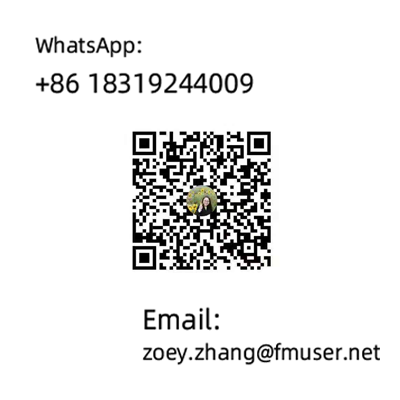Products Category
- FM Transmitter
- 0-50w 50w-1000w 2kw-10kw 10kw+
- TV Transmitter
- 0-50w 50-1kw 2kw-10kw
- FM Antenna
- TV Antenna
- Antenna Accessory
- Cable Connector Power Splitter Dummy Load
- RF Transistor
- Power Supply
- Audio Equipments
- DTV Front End Equipment
- Link System
- STL system Microwave Link system
- FM Radio
- Power Meter
- Other Products
- Special for Coronavirus
Products Tags
Fmuser Sites
- es.fmuser.net
- it.fmuser.net
- fr.fmuser.net
- de.fmuser.net
- af.fmuser.net ->Afrikaans
- sq.fmuser.net ->Albanian
- ar.fmuser.net ->Arabic
- hy.fmuser.net ->Armenian
- az.fmuser.net ->Azerbaijani
- eu.fmuser.net ->Basque
- be.fmuser.net ->Belarusian
- bg.fmuser.net ->Bulgarian
- ca.fmuser.net ->Catalan
- zh-CN.fmuser.net ->Chinese (Simplified)
- zh-TW.fmuser.net ->Chinese (Traditional)
- hr.fmuser.net ->Croatian
- cs.fmuser.net ->Czech
- da.fmuser.net ->Danish
- nl.fmuser.net ->Dutch
- et.fmuser.net ->Estonian
- tl.fmuser.net ->Filipino
- fi.fmuser.net ->Finnish
- fr.fmuser.net ->French
- gl.fmuser.net ->Galician
- ka.fmuser.net ->Georgian
- de.fmuser.net ->German
- el.fmuser.net ->Greek
- ht.fmuser.net ->Haitian Creole
- iw.fmuser.net ->Hebrew
- hi.fmuser.net ->Hindi
- hu.fmuser.net ->Hungarian
- is.fmuser.net ->Icelandic
- id.fmuser.net ->Indonesian
- ga.fmuser.net ->Irish
- it.fmuser.net ->Italian
- ja.fmuser.net ->Japanese
- ko.fmuser.net ->Korean
- lv.fmuser.net ->Latvian
- lt.fmuser.net ->Lithuanian
- mk.fmuser.net ->Macedonian
- ms.fmuser.net ->Malay
- mt.fmuser.net ->Maltese
- no.fmuser.net ->Norwegian
- fa.fmuser.net ->Persian
- pl.fmuser.net ->Polish
- pt.fmuser.net ->Portuguese
- ro.fmuser.net ->Romanian
- ru.fmuser.net ->Russian
- sr.fmuser.net ->Serbian
- sk.fmuser.net ->Slovak
- sl.fmuser.net ->Slovenian
- es.fmuser.net ->Spanish
- sw.fmuser.net ->Swahili
- sv.fmuser.net ->Swedish
- th.fmuser.net ->Thai
- tr.fmuser.net ->Turkish
- uk.fmuser.net ->Ukrainian
- ur.fmuser.net ->Urdu
- vi.fmuser.net ->Vietnamese
- cy.fmuser.net ->Welsh
- yi.fmuser.net ->Yiddish
THE POSITIVE IMPACT OF MASS MEDIA IN DEVELOPING COUNTRIES
Radio, newspapers, television, Internet, social media, etc., all of these are forms of mass media. Each of these outlets has the capability of bringing information to thousands of people with one device. While in some communities it is easy to take advantage of these communication outlets such as television and Internet access, not everyone has access to such outlets.
For developing countries that have implemented forms of mass media in their communities, there have been numerous positive outcomes.
Top 5 positive impacts of mass media in developing countries

1.Brings people together-
With implementing mass media in societies in Tunisia and Egypt, citizens were able to reach out to each other through social media platforms such as Facebook and Twitter and create, organize and initiate street protests and campaigns. Furthermore, having access to social media in developing countries, people are able to connect to those that they usually wouldn’t have the chance to talk to.
2.Provides educational opportunities-
In many countries, the division between local and national languages as well as issues of literacy can make communication difficult. With the use of mass media, a bridge can be built between these two gaps. In India, there is a radio station that provides information in local languages and respects local culture and traditions.
3.Watchdog for the public interest-
Media is the watchdog for public interest in many ways. One of the main ways is to create public awareness of what is going on with businesses and government officials. The media plays an important role in giving people the opportunity to act against injustice, oppression and misdeeds that they otherwise wouldn’t know about.
4.Information on available healthcare-
In Burkina Faso, a mass radio broadcast was sent out encouraging parents to seek treatment at local healthcare facilities for their sick children. With this mass outreach on healthcare, the encouragement of people to take their children to healthcare facilities saved thousands of lives. This easy way of encouraging others and bringing awareness about certain diseases was made possible through a simple radio broadcast.
5.Brings social issues to life-
Similar to “watchdogging”, media brings many social issues to life that otherwise would remain unknown to many people. In developing countries and communities like Burkina Faso, when the radio broadcast was released about malaria, diarrhea and pneumonia, people were educated and moved to action and knew to take their children to healthcare facilities for preventative care.
As it is seen, having access to different media outlets is vital for those in developing countries. Here are three ways that those in developing countries can implement mass media to help their people and communities.

1.Provide radios or newspapers in public places-
By providing radios and newspapers in public areas it gives community members to access news, information and emergency warnings. Even though radios can be on the cheaper side, there are still many people that can’t afford to have a radio in their home. By providing one in a local place, not only would it better educate the community members but also it will bring the community together.
2.Have the community involved in sharing the news-
When making individual communities responsible for providing their own news it not only makes them independent and proud of the work that they are putting out but it also has a positive effect on local economies. The media can provide many jobs that otherwise wouldn’t have been there.
3.Make media outlets a two-way platform-
Creating a two-way platform between the community and who are behind the radio stations, newspapers or broadcasts makes the community feel involved and that their voices are being heard. An organization called Soul City in sub-Saharan Africa is showing how well two-way platforms work by engaging their listeners and having them contribute thoughts and ideas about complex issues.
Whether through radio or cell phones, forms of mass media are constantly being used to inform, educate and strengthen people all over the world whether they be in urban or rural communities.One easy way to help gain access to mass media in developing countries is to reach out to government officials in the United States. Click here to email U.S. Senators about The Digital GAP Act and ask them to give first-time access to mobile or broadband Internet to 1.5 million people in developing countries by 2020.





